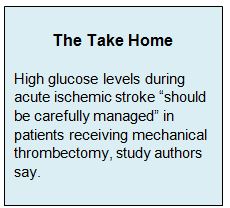Key Points:
- Post hoc analysis of RCT data looks at impact of blood glucose on outcomes after mechanical thrombectomy
- Hyperglycemia linked with poorer outcomes, especially for patients with partial reperfusion
Hyperglycemia appears to portend poorer outcomes among patients undergoing mechanical thrombectomy, according to post hoc analysis of data from the SWIFT trial published online December 10, 2015, ahead of print in Stroke.
SWIFT, published in the Lancet in 2012, was a multicenter randomized trial comparing the Merci and Solitaire FR devices (both Covidien) for mechanical thrombectomy in the setting of acute ischemic stroke.
Using data from SWIFT, Jeffrey L. Saver, MD, of the UCLA Stroke Center (Los Angeles, CA) and colleagues sought to understand whether baseline glucose level as a continuous variable or hyperglycemia (defined as blood glucose levels >140 mg/dL) might influence results.
Patients who presented with hyperglycemia were less likely to have an excellent outcome (modified Rankin Scale [mRS] score 0-1) at 3 months than those without high blood sugar. The presence of hyperglycemia had no impact on reperfusion rates, however (table 1).

On multivariate analysis, hyperglycemia was linked to greater risk of patients being disabled at 3-month follow-up (adjusted OR 0.22, 95% CI 0.06–0.82).
Among those with incomplete reperfusion, higher glucose levels were independently associated with lower likelihood of excellent outcome at 3 months (adjusted OR 0.58 per 10 mg/dL increase in glucose; 95% CI 0.34-0.99). No such relationship was seen among patients with complete reperfusion.
Management of Hyperglycemia Mandated
“Hyperglycemia is a predictor of poor outcomes after acute ischemic stroke,” write the authors. “However, the literature has identified fundamental complexities in the role of glucose in ischemic injury. The mixed effects of glucose on brain ischemia contribute to the difficulty in determining whether aggressive glucose management would be helpful to patients.”
The current findings, they say, “suggest that high glucose levels during [acute ischemic stroke] should be carefully managed” in patients receiving mechanical thrombectomy. Yet because the effects of hyperglycemia are likely to vary “under different clinical circumstances, further investigation is warranted to confirm our results,” Saver and colleagues stress.
Source:
Kim JT, Jahan R, Saver JL. Impact of glucose on outcomes in patients treated with mechanical thrombectomy: a post hoc analysis of the solitaire flow restoration with the intention for thrombectomy study. Stroke. 2015;Epub ahead of print.
Disclosures:
- Dr. Saver is an employee of the University of California, which has patent rights in retrieval devices for stroke. He also reports receiving stock options for services as a scientific consultant from Cognition Medical and funding for services as a scientific consultant from Medtronic/Covidien, Stryker, and Neuravi.


